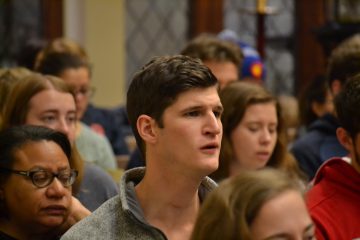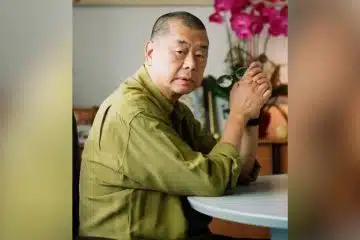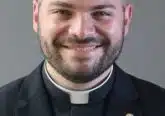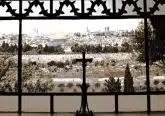High schools help students discover their call
Friday, January 15, 2010
By Eileen Connelly, OSU
ARCHDIOCESE — The key to discovering one’s vocation is recognizing that God has the plan and each of must open our hearts and take the time to listen to what He is calling us to do with our lives. At area Catholic high schools specific classes, presentations and opportunities for prayer and discernment are geared toward helping young people recognize their call, whether it is to the priesthood, religious life, marriage or remaining single.
As part of the formal vocations program at St. Xavier High School, the students receive vocation talks and visits by Jesuits, including an annual novice tour during which there is a time of interaction specifically with the young men who have an expressed an openness and interest in a religious and/or priestly vocation, said Jesuit Father Glen Chun, vocation promoter for the Chicago and Detroit provinces. Special days of prayer or consideration for vocations are also presented in schools throughout the provinces and brochures and posters about Jesuit vocations are also made available.
 |
| Jesuit Father Pat Fairbanks chats with Michael Mazzei, a senior at St. Xavier High School. (Courtesy photo) |
The speakers, who address all grade levels, “pretty much reflect on their call and their vocation journey — their backgrounds and how they were led to this way of life,” said Bill Schlater, head of the religion department at St. Xavier.
The concept of vocation is emphasized throughout the students’ four years at St. X, he added, as reflected in the school’s motto of being “men for and with others,” while always seeking the magis — the more — and living lives in pursuit of justice and service to community as exemplified by Jesus Christ.
Schlater said the young men truly take these words to heart. “I do see a desire, something within themselves, to find real meaning in their lives and be of service to others.
Vocation awareness at St. X also comes in the form of the Jesuit presence at the school, including Fathers Tim Howe, president, Ed Pigott, rector, a 1955 graduate, and Fran Daly, director of Ignatian formation for adults. Schlater believes that presence provides a “distinct advantage” in terms of promoting vocations. “It’s not a matter of having the Jesuits in the building wearing collars, but of having individuals present that the students can relate to who are happy, fulfilled and passionate about what they do. When they see that, they’ll give a Jesuit vocation consideration because they want the same thing in their lives.”
At St. Ursula Academy the Christian Lifestyles class, a required course for seniors, examines “what God wants be to be in life,” said Sara Carsten, head of the religion department. The first part of the one-term class deals with topics such as identity, communication, love and intimacy and general life skills, while the second half looks at lifestyle choices, specifically single and religious life and marriage, and the concept of call.
In discussing single life with her students, Carsten said “we talk about the secular view of single life, how sometimes it’s seen as a lifestyle by default, rather than being celebrated. There are challenges, but rather than focus on what’s lacking, I emphasize the great things about being single, like the freedom, opportunities for solitude and the depth of the friendships you can have.”
During the religious life portion of the class, the students look at the different religious orders, learn about the meaning of the vows and are visited by a member of the Ursulines of Cincinnati who shares her vocation story.
“I think some of the students have a very narrow view of what it means to be a Sister, so the presentation helps demythologize religious life in some ways,” said Carsten. “We also watch a video on Mother Teresa, so the students are exposed to the different ways of life that Sisters lead. They come to realize that women aren’t dragged kicking and screaming to become Sisters; it’s a choice, and what they feel God is calling them to do.”
At the end of the term, she said, “I think the students feel better knowing they don’t have to have it all figured out right now. It’s a relief in the midst of making their college decisions. They realize they just need to open their hearts to see where God is leading them.”
Vocation awareness at Chaminade Julienne High School in Dayton includes educating students through the religion department curriculum. According to Tim Dillon, department chairperson, during a unit in the freshman religion classes, students learn about the high school’s founding orders — the Marianists and the Sisters of Notre Dame de Namur — and vowed religious give presentations. Lay Marianists also present periodically to give the students “the whole spectrum of the meaning of vocation,” Dillon said, noting the signficance of the talks amid CJ’s diverse student population, many of whom have had limited contact with vowed and ordained religious.
During their senior year, CJ students are required to take Christian Lifestyles, which begins with a unit on vocations.
“We distinguish between the meanings of vocation — the baptismal call to holiness for all Christians and the state of life call to a particular lifestyle — marriage, vowed religious, the priesthood and single life,” Dillon explained. “We also mention that careers are also called vocations, for example that of a Catholic school teacher. What you’re doing with your life is more important than how much money you make. It’s the sense of service that’s important.”
The students are also required to select two religious orders to research then give presentations to their classmates. In addition, a Sister of Notre Name de Namur addresses the class about discernment, where they are in their lives, the sense of being called to something and using their gifts and talents in service to others. Dillon believes the school’s vocation awareness efforts “give students a positive image of vowed religious and an understanding that these are real, approachable human beings and that what they do is motivated by love. For a lot of students, it’s hard to understand why people why would give up marriage and sexual relationships. Vowed religious come across as being very solid, caring people, and it helps the students hear about their experiences.”
Eileen Connelly, OSU, can be reached at [email protected].



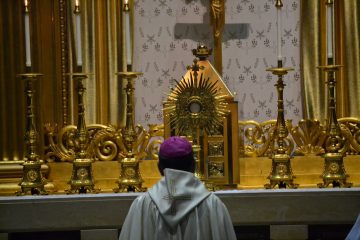

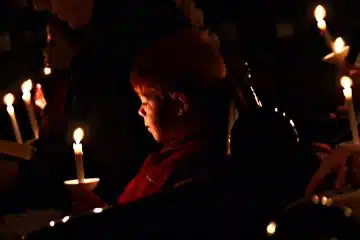

![The night is advanced, the day is at hand. Let us then throw off the works of darkness [and] put on the armor of light Romans 13:12 Rorate Mass Old St Mary (CT Photo/Greg Hartman)](https://www.thecatholictelegraph.com/wp-content/uploads/2018/12/DSC_0569a-360x240.jpg)
